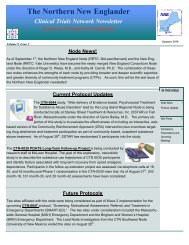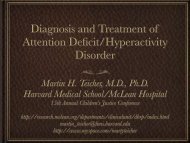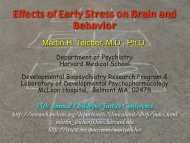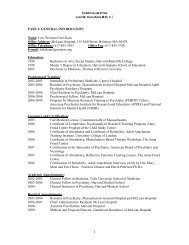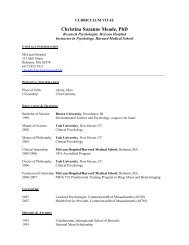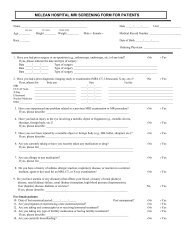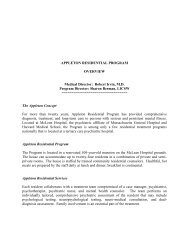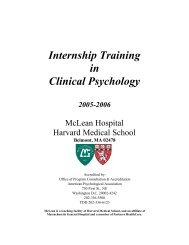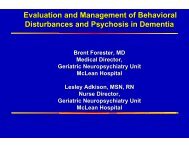Spring 2005 - McLean Hospital
Spring 2005 - McLean Hospital
Spring 2005 - McLean Hospital
Create successful ePaper yourself
Turn your PDF publications into a flip-book with our unique Google optimized e-Paper software.
THE MCLEAN HOSPITAL PSYCHOLOGY<br />
INTERNSHIP IN THE 21 ST<br />
CENTURY<br />
Edmund Neuhaus, PhD, (‘88) Associate Director of Psychology Training<br />
The <strong>McLean</strong> <strong>Hospital</strong> Psychology<br />
Training Program is thriving. Each<br />
year, we receive approximately 150<br />
applications for six internship positions.<br />
Gone is the longstanding ritual of “call day,”<br />
when prospective trainees would learn<br />
where they would spend their intern year.<br />
That process was replaced five years ago<br />
with a computerized match program—one<br />
that brings to <strong>McLean</strong> top graduate students<br />
from across the country. Fortunately for us,<br />
many stay and become members of the<br />
<strong>McLean</strong> faculty. For those who leave, most<br />
go on to tenure track or medical school<br />
academic positions. The <strong>McLean</strong> internship<br />
has an outstanding reputation as a topnotch<br />
scientist-practitioner training site.<br />
In the <strong>McLean</strong> tradition, training focuses on<br />
state-of-the-art psychosocial treatment.<br />
While largely cognitive behavioral, it integrates<br />
other perspectives in fundamental<br />
ways. For example, it includes a psychodynamic<br />
component and it draws on self-inrelation<br />
principles. There are still more<br />
elective training opportunities than hours in<br />
the day, and the supervisory faculty continue<br />
to be of the highest quality. A particular<br />
point of pride is that our interns continue to<br />
rank supervision as one of the best parts of<br />
our program.<br />
Beginning in the 1996-1997 academic year,<br />
Philip Levendusky, PhD, and I assumed<br />
leadership for a fully integrated clinical<br />
psychology internship. The primary training<br />
site is the Behavioral Health Program (BHP),<br />
which is <strong>McLean</strong>’s largest partial hospital<br />
program (700 admissions per year) with<br />
three specialty tracks: MAP (Mood and<br />
Anxiety), GAP (General Adult), and<br />
Borderline Personality. Interns see large<br />
numbers of patients and have substantial<br />
training in both individual and group<br />
therapy in the partial hospital program as<br />
well as in the hospital’s outpatient clinic.<br />
Because of my position as director of the<br />
BHP, trainees are fully integrated into the<br />
clinical program. There are 40 staff; more<br />
than 10+ trainees (six interns, two postdocs,<br />
practicum students, social work<br />
interns and a resident in psychiatry). While<br />
many staff have come and gone through<br />
the years, certain faithful long-serving staff<br />
remain; most notably, Annmarie McCarthy,<br />
RN and Ken Blair. The program is located<br />
in the Recreation Building, which was<br />
beautifully renovated for us in spring 2004.<br />
For those of you who were at <strong>McLean</strong> prior<br />
to 1994: the BHP is a descendant of the<br />
CBTU program and Codman III (which later<br />
became Hill Waverly), which merged in<br />
1994. If you were here before 2000, the BHP is<br />
a result of a merger of MAP and GAP. The<br />
GAP program changed dramatically as<br />
long-term psychotic patients were tracked<br />
into community based services, resulting in<br />
a new focus on short-term managed care<br />
treatment. For those of you who were at<br />
<strong>McLean</strong> prior to 2002, we introduced a<br />
specialty track for borderline personality<br />
disorder, a specialty many of you may think<br />
was long overdue. We have successfully<br />
and productively collaborated with that<br />
program’s leadership, John Gunderson, MD,<br />
and are treating patients from across the<br />
country who actively seek out our program<br />
for the specialized care we offer. The irony<br />
for those of you who trained at <strong>McLean</strong><br />
pre-1994 is that we have a “long-term”<br />
borderline track of two months. Short- term<br />
treatment is now one to two weeks, even at<br />
<strong>McLean</strong>.<br />
While changes continue to occur at <strong>McLean</strong><br />
and in psychology training, one constant<br />
prevails, and that is <strong>McLean</strong> is a great place<br />
to train and work.<br />
Edmund Neuhaus, PhD<br />
While changes<br />
continue to occur<br />
at <strong>McLean</strong> and in<br />
psychology training,<br />
one constant<br />
prevails, and that<br />
is <strong>McLean</strong> is a<br />
great place to<br />
train and work.



